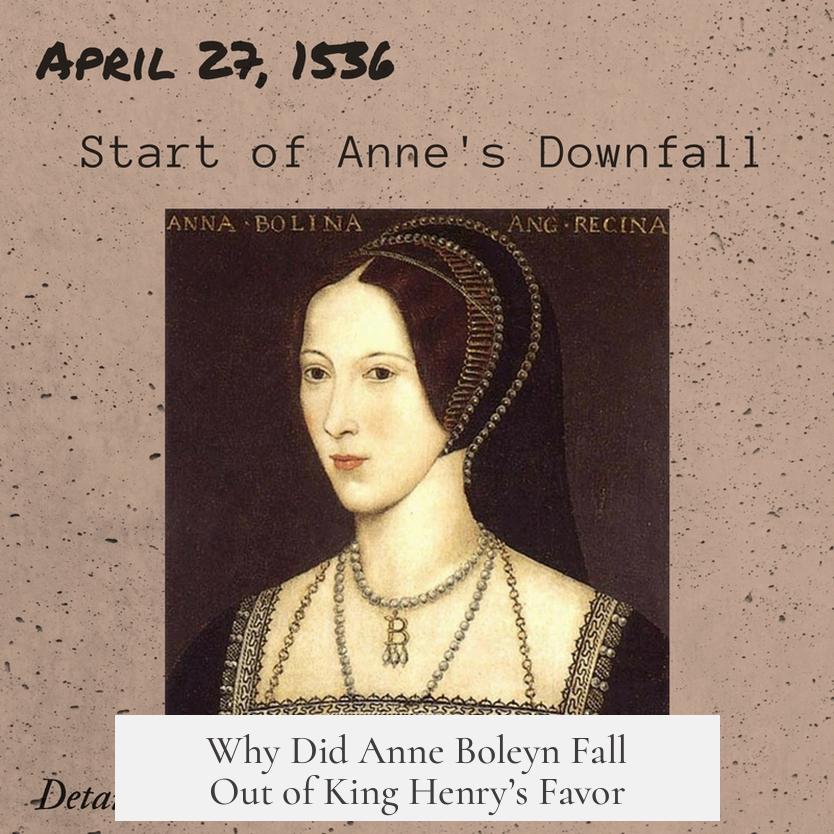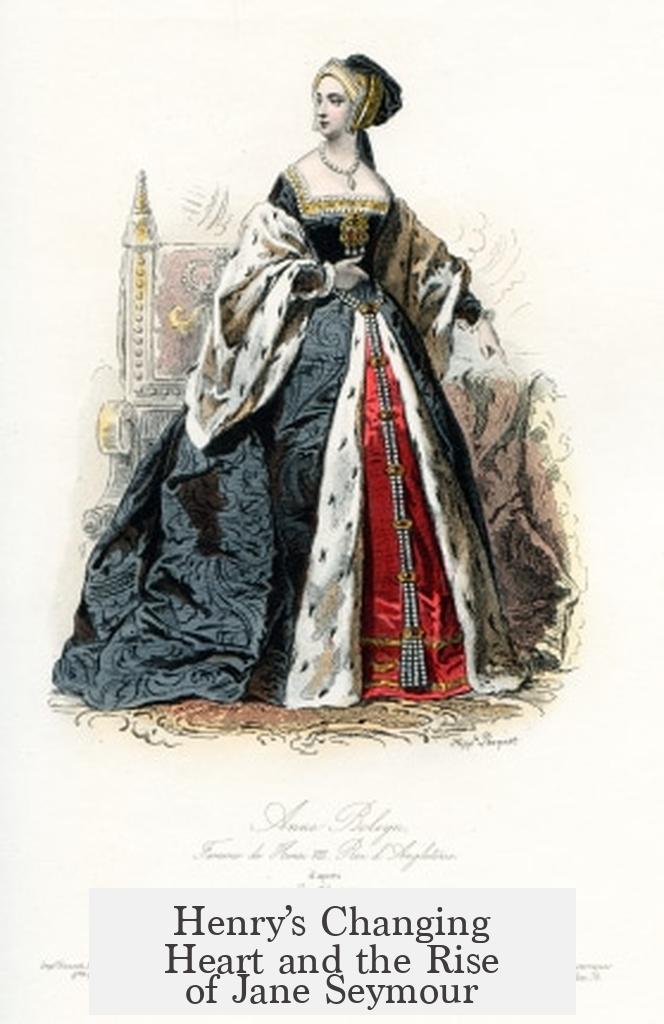Anne Boleyn fell out of King Henry VIII’s favor largely due to her failure to produce a male heir, accusations of adultery, political intrigue driven by Thomas Cromwell, and Henry’s shifting personal interests.
Henry VIII’s primary goal in marriage was to secure a male heir to continue the Tudor dynasty. His marriage to Catherine of Aragon ended because she bore only a daughter, Mary. Henry believed their marriage was cursed because Catherine had previously been married to his brother, leading him to think his marriage was sinful and punished by God through the absence of a son. When Henry married Anne Boleyn, he hoped she would provide a male heir.
After marrying Anne, Henry was initially convinced the problem was solved, especially since she became pregnant soon after their wedding. However, Anne failed to produce a son. This failure intensified doubts about the legitimacy and divine approval of their marriage, especially within the turbulent context of the English Reformation, which challenged established religious doctrines. The absence of a male heir cast a shadow over Anne’s favor with Henry and court alike.
Further damaging her standing were accusations of adultery and conspiracy. Anne was charged with sleeping with several men, including her brother, George Boleyn, and courtiers loyal to Henry, such as Sir William Brereton and Mark Smeaton. The charges claimed she conspired to kill Henry to marry one of these men. These accusations did not align neatly with documented timelines or evidence, but they carried significant weight. In a male-dominated court, an adulterous queen threatened the legitimacy of heirs and royal authority. Henry and the court saw the charges as a way to denounce adultery and uphold strict penalties for women, reinforcing court control.
The role of Thomas Cromwell, Henry’s chief minister, is critical in understanding Anne’s downfall. Historian Eric Ives suggests Cromwell orchestrated much of the adultery trial without Henry’s direct involvement initially. Cromwell and Anne were political rivals with conflicting interests. Removing Anne from power benefited Cromwell by reducing her influence over Henry and the public. According to reports from the Spanish ambassador Eustace Chapuys, Cromwell was actively involved in spreading claims of Anne’s falling out of favor. He also secured confessions, likely under duress, to strengthen the case against Anne.
Henry’s interest was also shifting toward Jane Seymour around this time. However, according to Ives, Henry’s attention remained “courtly” rather than serious up to Anne’s trial. His eventual decline in favor toward Anne coincided with the major allegations against her, signaling a turning point in his personal and political life. Anne’s arrest removed a significant obstacle for Henry to pursue a new queen who might bear him a son.
Summarizing key reasons for Anne Boleyn’s fall from favor:
- Failure to produce a male heir increased doubts about divine approval of her marriage.
- Accusations of adultery and conspiracy, regardless of their factual basis, undermined her position.
- Thomas Cromwell’s political maneuvering accelerated the process against Anne.
- Henry’s growing interest in Jane Seymour made Anne’s removal advantageous.
These factors combined to end Anne Boleyn’s reign as queen, illustrating the precarious nature of royal favor dependent on producing male heirs, navigating court politics, and meeting the king’s personal expectations.
Why Did Anne Boleyn Fall Out of King Henry’s Favor?

Anne Boleyn fell out of King Henry VIII’s favor largely because she failed to produce a male heir, became the target of politically charged adultery accusations, and was edged out by Henry’s shifting interests toward Jane Seymour. Let’s unravel this dramatic tale of love, politics, and royal expectations.
The saga of Anne Boleyn’s rise and fall isn’t just a juicy palace scandal; it’s a window into Tudor England’s brutal blend of personal desires and political necessity. Henry VIII didn’t just want a wife; he needed a male heir to secure his dynasty. Anne wasn’t just a woman he loved but a symbol of hope for Tudor stability. When that hope flickered, things turned sour fast.
The Crucial Quest for a Male Heir
Henry VIII firmly believed God would bless his marriage with a son if he chose the right woman. His obsession with a male heir wasn’t vanity — it was survival. After all, his prior marriage to Catherine of Aragon ended amid rumors of divine punishment for marrying his brother’s widow. According to Tudor beliefs, his daughters were a sign of that curse’s lingering effect.
When Henry met Anne, she was around 25 and full of charm. Their relationship blossomed quickly. Henry was not shy about his affection. They married, and Anne became pregnant almost immediately. Naturally, everyone hoped the long wait for a male heir was about to end.
But, plot twist: Anne failed to produce a son. This was catastrophic. In Tudor England, this failure wasn’t brushed off lightly. Many saw it as God withholding favor, suggesting that the marriage itself was flawed. Remember, Henry had broken from the Catholic Church, splitting with the Pope to marry Anne. This religious upheaval added to the growing anxiety that the union was illegitimate or even cursed.
When Court Rumors Turn Dangerous: Accusations of Adultery
Here’s where the story pivots from royal romance to court intrigue and scandal. Anne was accused of adultery — a crime of the gravest sort. But it wasn’t with one man, no… rumors swept across the court that she was involved with her own brother, George, and several other men close to the King. These weren’t mere court jesters: the accused included members of Henry’s most trusted inner circle.
Such accusations were both shocking and terrifying. In a sharply patriarchal society, a queen’s infidelity threatened the lineage of the throne itself. Doubting the paternity of Anne’s child was akin to threatening the very foundation of Tudor rule. To Henry and his court, this was intolerable.
What’s ironic — and telling — is that the timeline of these alleged affairs often didn’t line up logically. But when you’re the King, rumors can be used as weapons, and harsh judgments follow swiftly. The jury was heavily influenced by the king’s desires; the verdict felt predestined before the trial began.
Enter Thomas Cromwell: The Shadow Player
Here’s the political chessboard’s dark corner: Thomas Cromwell. Often cast as the cunning architect behind Anne’s downfall, Cromwell had plenty of reasons to want her out.
Anne and Cromwell didn’t see eye to eye politically. As Henry’s chief minister, Cromwell was a formidable figure who benefited if Anne’s influence waned. Some historians argue he orchestrated the adultery charges as a trap, pulling strings behind the scenes to engineer her fall — even without Henry’s initial knowledge.
The Spanish ambassador of the time, Eustace Chapuys, noted these machinations. Cromwell allegedly pressured Henry that Anne was unfaithful. Following Anne’s miscarriage of what was believed to be a male fetus, tensions peaked. Cromwell reportedly forced a key witness to confess under torture, sealing her fate and paving the way for Anne’s arrest.
Henry’s Changing Heart and the Rise of Jane Seymour

Romance in the Tudor court is never static. While Henry was courtly toward Anne up until her trial, his focus gradually shifted to Jane Seymour, a gentler and seemingly more obedient figure.
At first, his attention to Jane was more flirtatious than decisive. However, once Anne faced adultery allegations, Henry’s affections turned sharply against Anne. The king’s personal feelings were inseparable from politics — favoring Anne meant political endorsement. The moment suspicion dropped on her, Henry was ready to move on.
This transition underscores the volatile nature of royal favor. Anne’s fall wasn’t just a legal downfall; it was a rapid emotional and political eclipse, catalyzed by Henry’s shifting heart and the complex court dynamics.
So, What Really Sealed Anne Boleyn’s Fate?
- Failure to Produce a Male Heir: This was the root cause. In Tudor policy and belief systems, no son meant no divine approval. It destabilized Henry’s confidence in Anne and the legitimacy of their marriage.
- Adultery and Conspiracy Charges: Whether true or fabricated, these allegations destroyed Anne’s reputation and provided legal justification for her eventual execution.
- Political Intrigue by Thomas Cromwell: His role in manipulating trial proceedings suggests that Anne’s fall was as much about power struggles as personal failings.
- Henry’s Changing Affections: The king’s eye drifting toward Jane Seymour sealed the end of Anne’s favor and safety.
These factors combined made Anne’s position unsustainable. Her fate was less about a single misstep and more about a perfect storm of religious upheaval, dynastic pressure, political scheming, and personal relationships.
Reflecting on Anne’s Story: Lessons and Insights
Anne Boleyn’s tale reveals how tightly power, gender, and religion were intertwined in Tudor England.
It also shows the perilous nature of royal favor — a queen’s voice could rise and fall not just on love, but on politics and progeny. Without a healthy male heir, Anne’s marriage lost its divine endorsement, becoming vulnerable to attack.
We might wonder — was Anne doomed from the start? Could a different outcome have emerged if she had produced a son? Perhaps pregnancy wasn’t just a private matter but a political act with immense stakes.
Her story underscores the volatility of court life at a time when women had limited power and were often seen as pawns in political games.
Final Thoughts
Anne Boleyn’s fall from King Henry VIII’s favor is a vivid illustration of the harsh realities faced by Tudor queens. It wasn’t just about romance but a complex weave of religious belief, political agendas, and the immense pressure to provide a male heir.
Her tragic end reflects the dangers of court intrigue and royal expectations. In the end, Anne’s story reminds us how history is shaped not just by love, but by politics, power, and the need for survival.
So next time you hear the question, “Why did Anne Boleyn fall out of King Henry’s favor?” remember: it’s a tale of ambition, faith, betrayal, and the unyielding demand for a son.




